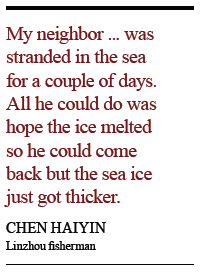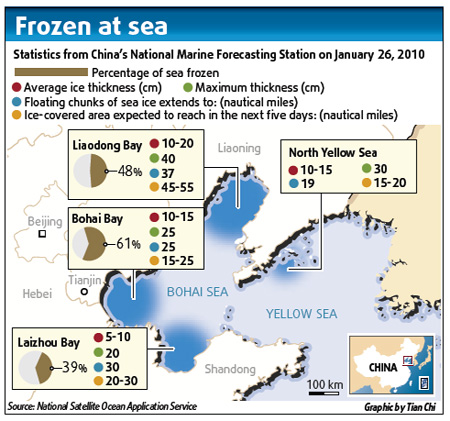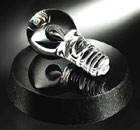Opinion
Deep freeze
By He Na in Huludao, Zhao Ruixue in Laizhou, Wang Shanshan, Liu Ce (China Daily)
Updated: 2010-01-27 07:57
 |
Large Medium Small |
|
|
|
A lone tricycle ride makes the dangerous journey across the frozen waters of Bohai Bay. [China Daily] |
More than 600 aquatic farms are scattered along Bohai Bay in Xingcheng and most are small, family-run businesses.
Qu Bo farms sea cucumber over an area of six hectares. He said some of the animals had already died because of a lack of oxygen.
"The ice is too thick. We can not get enough seawater inside the sea cucumber farm, which is a disaster for me," he said. "I have raised sea cucumber for more than five years but it is the first time I have seen such thick ice. I am really worried and I hope the weather will warm up quickly."
Small farms have also resorted to posting advertisements on lampposts throughout the area in an effort to sell their fish and reduce potential losses.
Aquatic farms in Laizhou, a city on the coast of Shandong province, have all suffered major losses, too.
China Daily found many farmers knocking through the ice covering the ponds to try to give their sea cucumbers some fresh air. "Most of my cucumbers died because they didn't have enough oxygen, and more than 1,000 kg of my shellfish froze to death in the sea," said Sun Chungao, who opened his aquatic farm only last year.
Men Xueliang added: "Many aquatic farms are facing problems. We hope the government or banks will consider providing low-interest loans to help carry us through the rough times."
Those living in many fishing communities along the coast of the Bohai Bay are also hoping the ice melts soon so they can return to work.
In Bingjia, which has a population of about 1,900 and is the largest fishing village in Huludao, most households own a boat.

"Late December until March is our resting time every winter. Besides repairing our boats and fishing nets, we just play poker or watch TV to kill time," said Ma Zhenbiao, 65, as he sat with his wife, Guan Yuhua, on the couple's kang, a heated brick bed. "This winter is much colder than previous years, though, so we stopped fishing much earlier. If the ice does not melt soon, our resting time will be much longer."
Ma, who has fished all his life, has earned 8,000 yuan ($1,172) last year, which is a little less than in 2008.
Most of the boats in Bingjia returned from sea in time before the small village dock were frozen, but several boats were stranded by the sea ice and are still unable to come back.
"My neighbor has a big boat and often fishes in areas much further than us. He comes back a little later than us every year," said villager Chen Haiyin, 38. "But this year more than 10 km of Bohai Bay quickly froze. He was stranded in the sea for a couple of days. All he could do was hope the ice melted so he could come back but the sea ice just got thicker. Finally, he had no choice but to head for Weihai in Shandong to find a place to dock his boat."
In Laizhou, fisherman Zhao Zhonghua in his late 30s has been surviving on a diet of noodles for more than three weeks. "I haven't been out to the sea for so many days and don't have much money left. I don't want to spend any money on vegetables or meat," he said.
Zhao is one of five fishermen who have stayed with their boats at the city's Haimiao Harbor, together with other 17 boats. Most of the other fishermen who work for Changyi Fleet left for home weeks ago.
"I need to sail and earn some money so my family can have a good Spring Festival," said Qin Linsen, who is in his 40s and is one of those anxiously waiting for the ice to disappear. His colleague Li Bo, who is in his 40s, added: "I have been on the boat for more than 20 days. I miss home."
The ice melted slightly on Jan 23 when the temperature rose and some fishermen attempted to take their boats out to sea. None of them traveled very far as the vessels struggled in the frozen water. Other fishermen stayed on land for fear of damaging their boats.
"I have been fishing in this harbor for more than 10 years and it is the first time I have seen ice this bad," a worried Li Dongzhi told China Daily. "There is much more ice and it also appeared much earlier. My boat has not been anywhere for more than a month - but this is the best time to catch fish."
In nearby Sanshandao Harbor, 60 boats went out to the sea at about 9 am on Jan 23. All returned the next morning.
Lin Gang said he brought back 400 kg of shrimp and fish. Smiling, he explained that, because of the ice, prices of most seafood had risen 40 or even 60 percent at Laizhou market.
















